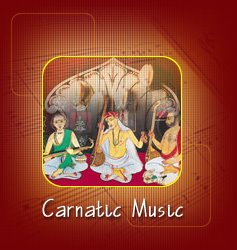 Biography
BiographySubramania Bharathi was born to Chinnaswaamy Aiyyar and Lakshmi AmmaaL in 1882 at Ettayapuram. He lost his mother at the age of 5. He learnt music from very young age and at 11 and was invited to a conference of Ettayapuram court poets and musicians for composing poems and songs. He accepted a challenge and composed a chindu on the model of kaavadi chindu of Annaamalai Reddiyaar. There he was given the title 'Bhaarati' for his ability to compose poems and songs.
At the age of 15 he married Cellammaal and in 1898 lost his father. At 22, he became Tamil teacher at Setupati High School in Madurai and the same year was appointed Assistant Editor of a daily newspaper called "Swadesamitran." In 1906, he was editor of a weekly magazine called "India" in Madras and the next year a friend of his, Krishnaswaamy Aiyyar received from him songs he had composed on patriotism and published them, titled "SudEsa geetangaL." In 1908 the government wanted to arrest him, but he escaped to PonDicerry (under French rule) and published "India" from there.
In 1912 he translated the Bhagavad Geeta into Tamil and composed songs on Krishna (KaNNan PaaTTu), "Kuyil," and "Pancaali Shabadam" (on Draupadi of the Mahaabhaarata).
His national integration songs earned him the title "DEsiya Kavi" (National Poet).His patriotic songs emphasize nationalism, unity of India, equality of man and the greatness of the Tamil language. He sang these himself at Congress meetings at the Madras beach. He composed tamil keertanais on love, devotion,fearlessness, mysticism.
His stepbrother C.Vishwanaata Aiyyar and V.V.S. Aiyyar tell us that he himself set his songs to music and could sing them well in a variety of raagams. In "Bharata dEviyin tiru dasangam" he used 10 raagams.
In an article "Sangeeta Vishayam" (Issues in Music), Bhaaratiyaar rebukes musicians PaTnam Subramania Aiyyar and others for singing songs of the Trinity, without knowing the meaning because the songs are all in Sanskrit or Telegu. According to him, without knowing the meaning, singers are unable to sing with proper expression. He also saysthat songs usually portray devotion and love and not other emotions like courage, anger, wonder,fear, and hatred. He emphasized that musicians should not sing songs which they don't understand and should learn from Hindustani musicians how to train their voices.
He died in an accident on September 11, 1921 at the age of just 39.
Compositions:
Appavum ponnadi Jaymanohari Adi Krithi
Bharatha samudayam Hindusthani Behag Eka Padam
Chinna chiru kiliye Bhairavi Rupaka Krithi
Dikkuteriyada HanumaThodi Adi Krithi
Endaiyam tham Kambhoji Adi Krithi
Jayamundu bhayamillai Khamas Adi Krithi
Jiva padagai Anandabhairavi Adi Krithi
Jnanappal arulvai Saramati Adi Krithi
Kaathirukunren Sama Adi Krithi
Kanavendamo Sri Rupaka Krithi
Kanene en kanavan Mecha Kalyani Adi Krithi
Kanika kondutaram Varali Eka Krithi
Karumbu thottathile Saindhavi Misra Chapu Krithi
Malai pozhidil Nadanamakriya Adi Krithi
Mannar kulathinadi Nadanamakriya Adi Krithi
Muruga Muruga Nattakurinji Adi Krithi
Nenjukku neethi Sindhubhairavi Adi Krithi
Neram mikandidu Nadanamakriya Adi Krithi
Nithyamunai vendi Chakravakam Eka Krithi
Pillai prayathile Saraswati Manohari Eka Krithi
Sakthi tanake Bhoopalam Eka Krithi
Thanjamulakinil Punnagavarali Adi Krithi
Ujjaiyini Hindolam Adi Krithi
Umayirundavar Kambhoji Adi Krithi
Unnai yenamayil Kharaharapriya Adi Krithi
Vandadum cholai Harikamboji Adi Krithi



1 comment:
A wonderful Blog indeed! I appreciate very much! would like to see much more in this! Thank you!
P.S: I wonder if 'Vandadum Cholai' is written by Subramanya Bharathi! Can this please be verified?
--K.Balaji
Post a Comment